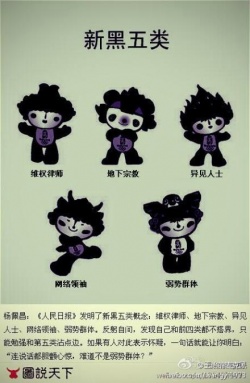“New five black categories”的版本间的差异
来自China Digital Space
小 (文本替换 - 替换“Category”为“分类”) |
|||
| (未显示1个用户的10个中间版本) | |||
| 第1行: | 第1行: | ||
| − | + | <h3>''xīn hēi wǔ lèi'' 新黑五类</h3> | |
| − | During the Cultural Revolution | + | [[File:NewFive.jpg|250px|right|thumbnail|''The new five black categories depicted as the 2008 Beijing Olympics mascots. (Weibo) '']] During the Cultural Revolution, the five black categories referred to five political identities: landlords, rich farmers, anti-revolutionaries, bad-influencers, and right-wingers. |
| − | On July 31, 2012, the People’s Daily overseas edition editorial simultaneously called for internal reform and warned against U.S. efforts to undermine China from the grassroots. Netizens | + | On July 31, 2012, a [http://chinadigitaltimes.net/2012/08/peoples-daily-chinas-real-challenge-is-the-next-5-10-years/ People’s Daily overseas edition editorial] simultaneously called for internal reform and warned against U.S. efforts to undermine China from the grassroots. Netizens latched on to [http://chinadigitaltimes.net/2012/08/141150/ this passage] in particular: |
| − | + | <blockquote>With “Internet freedom” as its slogan, they [the Americans] will attack “top down” governance in order to push forward the traditional model of liberal democracy; through the use of [http://chinadigitaltimes.net/china/rights-defense/ rights lawyers], underground religion, dissidents, Internet leaders, and disadvantaged social groups as the core forces, they will push for a “bottom-up” approach to Chinese governance from the grassroots to lay a foundation for changing China.</blockquote> | |
| − | + | <blockquote>以“网络自由”为旗号,改变“自上而下”推进民主自由的传统模式,以维权律师、地下宗教、异见人士、网络领袖、弱势群体为核心,以期通过“自下而上”的方式渗透中国基层,为中国的“改变”创造条件。</blockquote> | |
| + | Activists immediately picked up the five groups listed in the People’s Daily article and dubbed them the “new five black categories.” | ||
| − | + | [[分类:Lexicon]][[分类:Censorship and Propaganda]] | |
| − | |||
| − | [[ | ||
| − | |||
| − | |||
2023年8月7日 (一) 05:01的最新版本
xīn hēi wǔ lèi 新黑五类
During the Cultural Revolution, the five black categories referred to five political identities: landlords, rich farmers, anti-revolutionaries, bad-influencers, and right-wingers.
On July 31, 2012, a People’s Daily overseas edition editorial simultaneously called for internal reform and warned against U.S. efforts to undermine China from the grassroots. Netizens latched on to this passage in particular:
With “Internet freedom” as its slogan, they [the Americans] will attack “top down” governance in order to push forward the traditional model of liberal democracy; through the use of rights lawyers, underground religion, dissidents, Internet leaders, and disadvantaged social groups as the core forces, they will push for a “bottom-up” approach to Chinese governance from the grassroots to lay a foundation for changing China.
以“网络自由”为旗号,改变“自上而下”推进民主自由的传统模式,以维权律师、地下宗教、异见人士、网络领袖、弱势群体为核心,以期通过“自下而上”的方式渗透中国基层,为中国的“改变”创造条件。
Activists immediately picked up the five groups listed in the People’s Daily article and dubbed them the “new five black categories.”





